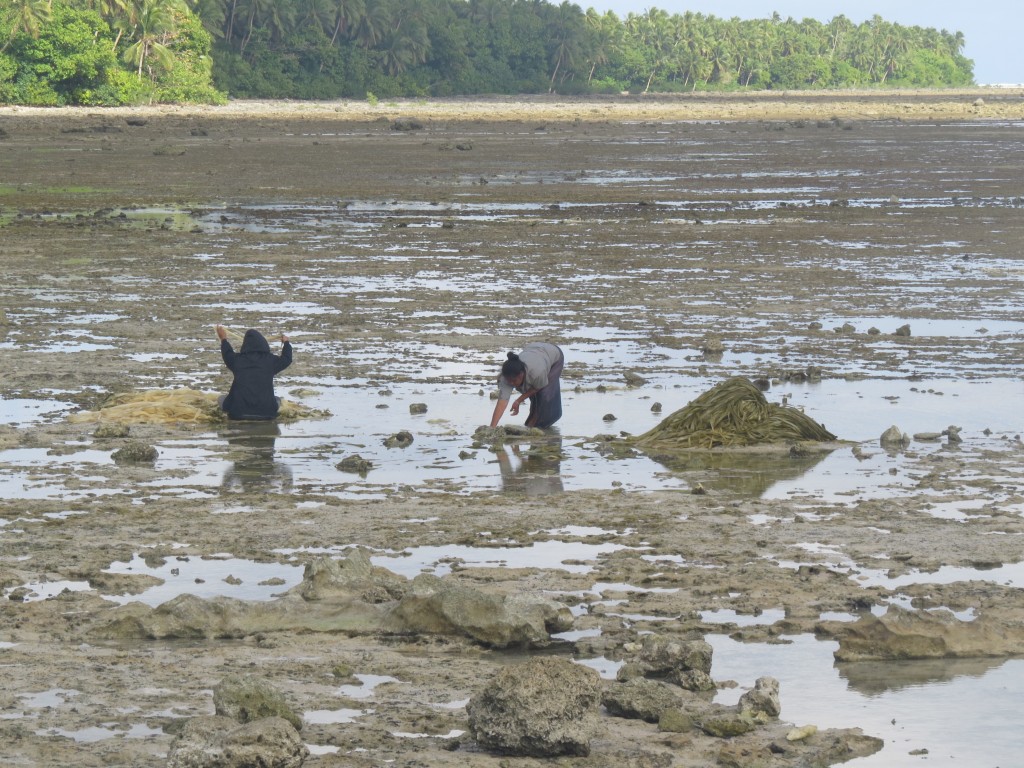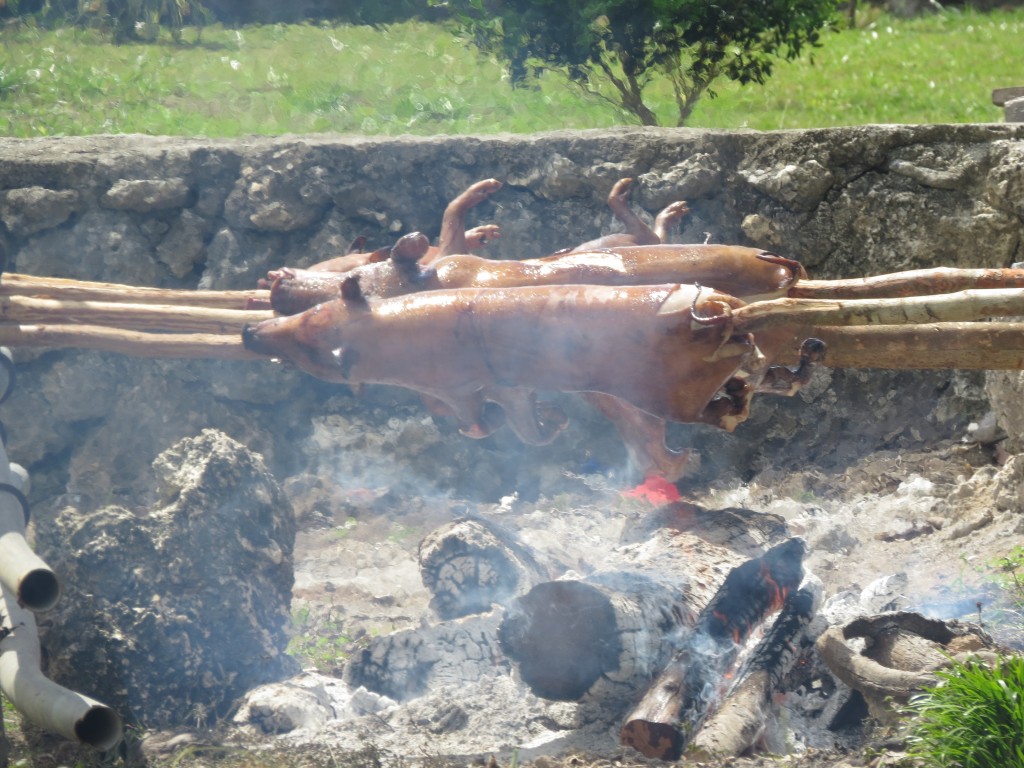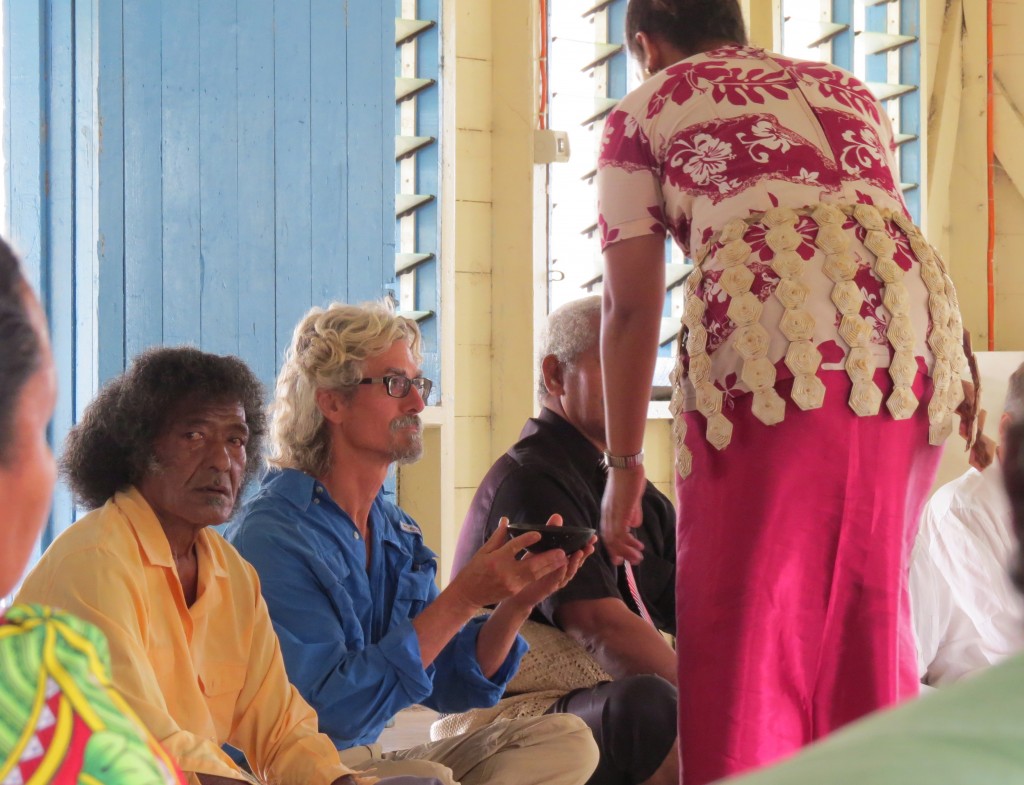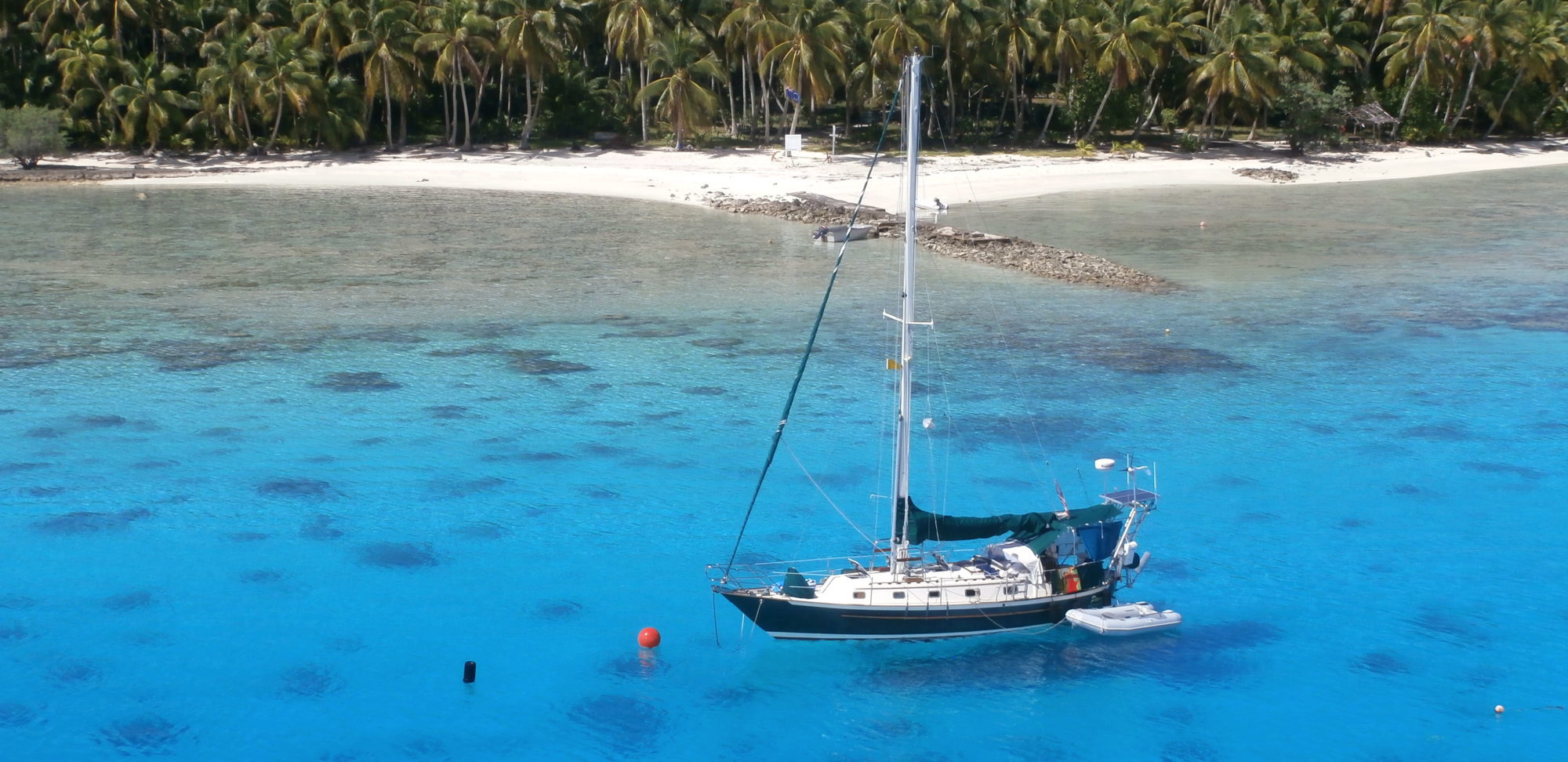A day out from Apia, Samoa, Pamela was floating in a calm, glassy sea with her engine driving her at a leisurely 4 knots. Next stop, Niuatopotapu, a remote island in the Kingdom of Tonga called “the Sacred Coconut” in Tongan and referred to by cruisers as “New Potatoes”, lay about 180 miles to the south west. With wind predicted in the mid-teens from the east-southeast, I was looking forward to an easy sail, beam reaching, two nights and one day of easy sailing. After two weeks in the heat of Apia harbor, dirty with the grit of construction around the bustling commercial port, I was ready for a fresh sea breeze and blue water.
The first night had been quite calm. We had motored quietly out of Apia harbor at sunset, then hoisted all the sails to catch a faint seven knots of breeze that eased Pamela ever so slowly along the northern shore of the island along a black coastline punctuated by a string of lights, the last lights we would see for many weeks. A northwest squall had suddenly pounced as we were traversing between Samoa’s two main islands, ‘Upolu and Savai’i, but the squall had lasted only a few minutes, with full main and jib pushing Pamela over hard and me holding the wheel with knuckles that shone white in the moonless night.
Now in the daylight, I felt the wind slowing to six knots, five knots, four knots, steadily decreasing and causing the main sail to flap like a half dead fish. If only we could get seven knots of wind! With that magic number we could fill our sails and glide through these smooth seas making good progress to Tonga. I would trade four knots of wind for a gale, I thought, then hastily rapped my knuckles against the teak combing.
We lowered the forlorn sails and ran the engine throughout the morning. I knew a rugged marine diesel engine could take it, running for days on end. Looking out at the endless ocean, however, and imagining the miles ahead, the horizon that never changes, the soft lines of waves resembling the time-worn blue ridges of the Great Smoky Mountains, the water flowing by with the leisure of country folks strolling home from church, and the little stream of wake behind gurgling like a spring emerging from a rock in a hollow of those mountains, watching this slow-moving scene for hour upon hour, and knowing that it will proceed like this for mile upon mile, you begin to doubt the longevity of the diesel engine, you place your trust in the sails and you long for the coming of the wind.
I listened to the tunka-tunka-tunka of the engine for hours, then ducked below for a few hours rest while Pam took over. I came back up into the cockpit in the early afternoon and stared again at the wind instruments, willing the wind to push the needle from four to seven. No use. I sat back down against the combing and continued reading. What was I reading now? I was losing track — four different e-books about London in the Middle Ages, the recent wars in Afghanistan, Tom Neale’s account of living alone on the island of Suwarrow, and a Louis L’Amour western about men with fists of steel; a couple of paper books including the complete short stories of Robert Louis Stevenson and the history of the Beaufort Scale; and audiobooks about the Mayflower, the history of Greece, and an interesting account of how LSD swept like wild fire through the 60’s. So many subjects, some would say an eclectic collection, but none I wanted to read this afternoon. I just wanted some wind.
The wind generator mounted above my head began to turn, slowly at first, and then steadily. Eight knots! I hoisted all sails and watched them begin to fill, happily shutting down the engine. Ah, the sound of the wind and waves once again, no more tunka-tunka-tunka. Six-foot waves began to form from the south-east, pushing against Pamela as she attempted to leap over them like a puppy chasing a butterfly.
The sky was beginning to fade into a mass of leaden gray, a few blotches grayer than the others, and the wind continued to rise, soon into the high-teens. It seemed as soon as the sails were hoisted it was time to reef them again, first one reef then two, giving me a late-afternoon aerobic workout. The waves were steeper now and coming from two different directions. Suddenly there was a blast of spray, warm and salty, across the dodger and over the combing, drenching my head and washing away the Apia grime, baptizing me in the name of Poseidon, brother of Zeus, with trident in hand.
I put on my foul weather gear, a little late perhaps, then pulled down the hood over my soggy head and snuggled under the dodger in a vain attempt to stay dry or less wet. The waves were now hitting us hard as if Poseidon was exchanging his trident for a hammer. Every minute or so another steep one crashed with sudden intensity against the beam, sending Pamela far over on her starboard side, forming whitewater down her port railing, and spraying the cockpit with a furious blast. The wind generator shrieked in pain as the twenty-five-knot gusts spun its blades in a tortured frenzy, then stopped altogether as the winds reached Force 7, switching on a mode called “hysteresis braking” to protect the turbine. I wished I could apply hysteresis braking to Poseidon’s wind generator. “You wanted wind!” he shrieked, then jabbed Pamela once more with his trident to send her tumbling down into a trough.
The sullen remains of daylight began to peter out, giving way to a sodden blackness, and I clipped on the safety harness and settled my mind to endure a long night of bumper cars on the high seas. The rain came off and on, indistinguishable from the flying salt spray, and the entire universe was a swamp of wet darkness. My foul weather clothing could not keep out this universe and became as sodden as all the rest.
I dozed off and on, sometimes listening to the crash of waves, sometimes the story of LSD or the Mayflower, shivering as I lie on the soaked cushions pushed hard against the low side of the cockpit. With Pamela’s low freeboard, the whitewater rushed just a few inches past my head. A pale moon struggled to emerge through the black clouds and managed to illuminate the whitecaps from time to time. The sea was a roaring, swirling washing machine, and the long night wore on.
Daybreak came timidly across the blank horizon, no sun, just a gradual lightening of the solid gray. I rose to awaken my creaking bones and stiffened ligaments, surveying the scene. The seas were still pounding, the wind still in the twenties. The self-steering windvane was holding up its end, keeping Pamela on a straight course. The main sail kept its aerodynamic curve without signs of strain. The jib showed a bit of dacron cloth beginning to come loose, but otherwise held tight in the onslaught of wind and waves. The dinghy folded in its bag was still securely lashed to the cabin top. The four diesel jugs were holding tight even though whitewater foamed past their bottom ends. The staysail in its cover looked soaked and dejected, but held firm with its hanks around the staysail stay. The spinnaker in its “box bag” was … wait, where was the spinnaker? I saw the tattered remains of the bag dangling helplessly over the side and knew at once the fate of the spinnaker. That beautiful white, red, and green sail with its wind sock and collar, costing several thousand dollars, was floating miles downwind on its way to Fiji like a giant ameba extending fingers of protoplasm, a writhing undersea umbrella for small sea creatures to hide under.
I tried getting angry, then sad, then laconically pensive, but after a night of shivering in the wet cockpit I didn’t have the energy for a proper kaniption fit. Oh well, what’s the use of having a spinnaker if you’re too lazy to fly it?
The wind howled stiffly from the south-southeast all day. Pamela bashed into the pounding waves with her chin held high, but with the wind in the south quadrant we were moving progressively fifteen degrees off our course to Niuatopotapu. We tacked back to our rhumb line but the starboard tack carried us to the northeast, well away from our target, and at no better than three knots. Starboard tack proved to be rather wet, with leaks around the port chainplates, enough to cause a salty puddle on the saloon floor.
A few days later we fetched up in Niuatopotapu harbor, cold, wet, and miserable. The wind was still howling. Our broken transmission cable made the anchoring procedure a nerve-racking trial, but our friends on Southern Cross put their dinghy in position and shouted, “Drop it here!”
What a relief it was to be floating in flat water inside the reef of Niuatopotapu! We spent the following day drying out our clothing and the insides of the boat, catching up on sleep. I’d spent 60 hours straight in the cockpit the last few days of the passage, and I slept like fallen coconut tree.
The kids on shore were cute, asking if we’f brought them candy in English they were learning in the village school.
“Where’s my lolly?” asked a boy about eight years old.
“My lolly!” repeated his younger sister, about six.
“Lolly,” came the high-pitched song of her sister, about four.
Meanwhile I counted the pigs in the village. Including the four that were rooting through the coral several yards out on the exposed low-tide reef, I counted nineteen. The sows hurried across the road as we approached, with their tiny spotted piglets galloping in zig-zags behind them.


After meandering through the village and exploring the coconut groves I was returning to the dinghy landing when I met a young man who had just come ashore. From a distance I saw him land, tie up his boat, then hop up onto the landing. He was putting on his knapsack as I approached, and something about his movements seemed asymmetrical.
“I’m Dustin,” he introduced himself. He had just arrived from Hawaii by way of Pago Pago and appeared to be going solo.
“Singlehanding?” I asked.
“Literally,” he replied.
It was then I noticed he didn’t have a left arm. Nor a left leg, for that matter. The leg was a steel-rod prosthetic with a weather-beaten tennis shoe attached. The missing arm was a stump attached to a shoulder, pointing up and down in gesticulatory agreement when he waved his right hand. He was in his late-thirties, solo-sailing his 35-foot sailboat Rutus.
“What does ‘Rutus’ mean,” I asked him later when we were having dinner on board Pamela, sitting down to enjoy a hearty Oaxacan chicken mole with a warm loaf of whole wheat bread that Pam pulled from the oven.
“A rutus is a wooden sword that the ancient gladiators used to train with,” Dustin explained.
I tried to imagine how I could sail Pamela with only one arm. Each time I reached for a line or a winch handle I thought what it would be like without two hands. There is a nautical expression, “one hand for the ship and one for yourself”; meaning, when operating the boat you always need to be holding on tight. But in Dustin’s case the hand for the ship took priority.
But Dustin was completely content with his situation. He was putting in more effort than any other sailor, and perhaps putting his life on the line. But, he said, if it weren’t for his unfortunate motorcycle accident, hit by a drunk in a truck, he probably wouldn’t be out here sailing. Dustin struck me as the most well-adjusted young sailor I’d met.
A few days later he and I were free-diving with Jack from Iguana. I’d never been spearfishing before, so Jack was showing me the basic moves. Jack, about twenty-eight, was quite a fisherman and kept Iguana’s freezer full of ahi, mahi mahi, and wahoo. He’d been at Niuatopotapu for two weeks when we’d arrived, and he’d been out spearfishing every day. Several times he’d spotted humpback whales swimming lazily off the reef.
“Let your body go completely slack,” he said. “Minimal movement, feel your heart rate go down. Take a few deep breaths then point straight down and kick.”
I went down about fifteen feet then came back up a moment later slurping air. I still had the unpleasant memory of diving twenty-five feet in Suwarrow to release my tangled anchor chain, not properly clearing the pressure from my ears.
“That’s going to be pretty hard with those fins of yours. They’re short and they’re also flexing 90-degrees.”
I stared at my sadly flexing swim fins. Compared to Jack’s and Dustin’s long fins mine seemed like stumps. One was about to break in half.
“There’s a couple giant clams down there,” said Jack. “See them? Dustin’s looking for a giant clam, so I’m going to go down and lay the speargun beside them.” Then down he went like a slow-motion torpedo moving gracefully with his long fins. He laid his speargun down in a sandy patch beside a coral shelf about twenty-five feet down, then resurfaced slowly a minute later. He motioned for Dustin to swim over to the spot. How could Dustin possibly swim down that far with only one leg and one arm? With my stubby fins I had kicked my hardest and only made it halfway.
“It might take a few dives to pry it off the coral,” Jack remarked. Then with a long screwdriver in his hand Dustin descended. From the surface I could see his body jerking at the giant clam down below. He was down there a minute or so before he began to resurface. With a grin he presented the huge clamshell, about a foot wide, in his good hand. A moment later he was down again, this time prying away at the second clam.
Jack showed me how to load his spare speargun, then swam off to hunt. I floated along the reef gazing at hundreds of tropical aquarium fish, none of which I could properly identify, with the exception of the turquoise-colored parrotfish with its goofy grin. I pointed the speargun at a brown-colored fish but decided not to shoot. I didn’t want to eat a brown fish with all these multicolored rainbows swimming about.
Finally, after several minutes of drifting I took aim at a parrotfish in a shallow area of the reef. Thwack went the speargun, sending the spear deep into a chunk of coral where the parrotfish had been a moment before. I swam down to pull out the spear but it was wedged tight. Several times I dove down and tugged on it. Multitudes of tropical fish swam by to watch, now that the spear was safely lodged in the rock. Finally the spear came out with a thunk. This spearfishing was turning out to be harder than it looked.
I tried to recall how Jack had showed me how to reload the spear, examining the strong rubber bands, impossibly short. I couldn’t pull them even halfway back to the trigger point, and even if I could there didn’t seem to be any way to latch them in place. Surely there must be something missing; maybe a special piece had fallen off when the spear was wedged into the coral. What would Jack say if I screwed up his speargun? I had to find that missing piece. I swam back to the edge of the reef to find the spot where I’d fired the speargun. Through canyons of coral and ravines of ridges I paddled hard against the surge, my stubby fins pumping hard. It all looked the same. If there in fact was a missing piece to the speargun I’d never find it. I swam back to the dinghy and waited.
After a long while Jack returned. I showed him the speargun. “It’s perfectly fine,” he said. A moment later he had it loaded. Damn, I need to figure this out.
“Did you get any fish?” I asked him.
“A couple. Inside the boat.”
I looked in the dinghy and found several large parrotfish and an enormous fish with a head the size of a tire. Jack was particularly proud of it, called an uloua in Hawaiian, a large trevally. He was not satisfied that I’d come up empty-handed on my first spearfishing odyssey and he insisted that I go down again and shoot something.
I found an unsuspecting parrotfish and fired, again burying the spear tip into a coral bank, but this time about fifteen feet down. I pulled on the spear a moment, then floated up a few feet and pulled on the tether, then floated up a few feet more until I was upside down and nowhere near the surface of the water. I floated there a moment gazing up at the rich oxygen above the surface and wishing I could get some but reluctant to let go of the speargun’s tether. I finally had to let go of the gun, popping up the surface with a mighty gasp. Jack dove down without a word and quietly retrieved the abandoned speargun.
I was feeling rather ridiculous at this point.
Meanwhile, Dustin appeared with his third giant clam.
Jack urged me to try once more. I was freezing cold by this time, furious with my retarded swim fins, and wanted to go home. I fired again at a parrotfish and this time got lucky. I pulled the little guy up to the surface and felt like the Great White Hunter. Next to the trevally with the tire-sized head my parrot fish was nearly invisible.
“Your first kill,” Jack intoned. “Not bad.” He paused and then pointed. “Look down here. See that grouper?”
I looked into the depths where Jack was pointing. I saw a few angelfish and triggerfish but no grouper. Besides, I didn’t quite know what a grouper looked like.
Jack continued to point. I looked again and saw nothing. He pointed again. It was beginning to feel like a bad comedy. I decided to dive down once more and have a closer look.
About fifteen feet down I came upon a beautifully fat purple fish covered with plump black dots. It was love at first site.
I fired at the grouper and then pulled on the tether to see if there was anything like a grouper attached to it. Miraculously the spear did not go into a coral bed. It went right through the head of my cartilaginous prey.
“Great shot!” exclaimed Jack. “Way to go! Let’s call it a day.” With chattering teeth I agreed and clambered aboard the dinghy. The dark-purple grouper was the second largest fish in the dinghy, next to the big trevally. Ah, sweet redemption for an ex-trout farmer.
That evening we enjoyed a fantastic feast aboard Pamela. Dustin marinated his clams in a Hawaiian poke sauce and served them with great panache. Jack provided a grouper and a couple parrotfish which Pam sautéed alongside my grouper in a coconut-cream sauce. Pam topped it all off with a loaf of fresh-baked bread made from olives and herbes de Provence.
As I lightly strummed my guitar and sipped white wine I reflected on the spearfishing that Dustin, Jack, and I had done and the bounty of fresh fish we had provided for our table, feeling perfect contentment. The winds died down to a whisper, the sky turned pink, and the developed world seemed like a million miles away.

